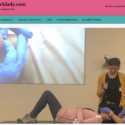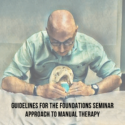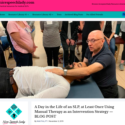Touch and Movement Education Seminar Attached here is the full course details for the new Foundations of Manual Therapy: Touch and Movement Education Seminar. It will be taught this coming May 13-16, 2020 in Olympia, Washington by Jason Erickson, LMT and Walt Fritz, PT. There is an early bird discount in place through March 13,… Continue Reading
Cover Songs
–Cover Songs- Finally, a post unrelated to manual therapy. Sort of. I thought that I’d have some fun sharing a bit about my music tastes and possibly find out a bit about your tastes. I’ve loved what I do for a living for nearly all of my career, whether it was in the early days… Continue Reading

Walt Fritz’s Neck, Voice & Swallowing Disorders Seminar: ‘The Experience’ (A Review of a Recent Seminar)
Walt Fritz’s Neck, Voice & Swallowing Disorders Seminar: ‘The Experience’ (A Review of a Recent Seminar) Wilson Nice, the owner of the website/blog NiceSpeechLady, recently attended one of my seminars and was kind enough to write a review of the class. Wilson supplies the SLP with TONS of free information and resources, so please give… Continue Reading

Crossed-arm syndrome
Crossed-arm syndrome The past decade seems to have been about losing friends. Leagues of MFR-type friends have gone away, no doubt due to my counter-culture statements and posts questioning much of what I was taught in my MFR training. I bid them a happy goodbye. So I suppose it’s time to alienate another cohort group;… Continue Reading

Podcast with The Knowledge Exchange on Biopsychosocial Aspects of Manual Therapy
Podcast with The Knowledge Exchange on Biopsychosocial Aspects of Manual Therapy I was fortunate to have had the opportunity to spend an hour today with Sydney, Australia-based personal trainer, exercise scientist, and exercise physiologist Daniel Pablo Arbillo. We spoke at-length about incorporating aspects of the biopsychosocial approach in manual therapy and, specifically, how my approach… Continue Reading

Intellectual Laziness and Dishonesty
Intellectual Laziness and Dishonesty People like stories and often the simpler the better. However, when we tell patients stories that are too simple, the message gets distorted, often so much so that we start believing these simple stories too. Stories, such as weakness as being the cause of pain/poor motor abilities or perceived tissue pathologies,… Continue Reading

Guidelines for The Foundations Seminar Approach to Manual Therapy
Guidelines for The Foundations Seminar Approach to Manual Therapy After having presented my work this past week to physiotherapists in Doha, Qatar, I was asked to provide a basic guidelines for therapists who are new to this work. While I am hesitant to install protocols for all aspects of this work I do see the… Continue Reading

Summary Paper on the Voice and Swallowing Disorders Seminar
Summary Paper on the Foundations in Manual Therapy: Voice and Swallowing Disorders Seminar Walt Fritz, PT In response to inquiries requesting information about the Foundations in Manual Therapy: Voice and Swallowing Disorders Seminar and how manual therapy applies to the field of speech-language pathology (SLP), this summary puts some relevant information all in one place.… Continue Reading
Poopbusters, and other tales
Manual therapy is rife with stories, and while some may show some truth, many are simply stories. They are often ones that we, the student, are sold. I bought into a lot of stories over the years though I doubt that I am unique in this endeavor. I spent much of my early days as… Continue Reading

Getting to yes. Using negotiation in the therapeutic process
Getting to yes: Using negotiation in the therapeutic process. Walt Fritz, PT(Updated January 2024) In this article, I want to dive deeply into the options available to the therapist, explicitly using a patient-centered, negotiation-driven model of care. A model like this becomes a therapeutic partnership, an alliance for a common goal. Contrast this model with… Continue Reading
Testimonials…ugh
Testimonials…ugh Testimonials are a common way of getting the word out about one’s serves and serve to grab the attention of people. While they can be useful for someone seeking input on another person’s satisfaction with a product or service when used in healthcare environments they tend to grossly overstate outcomes. Patient satisfaction should go… Continue Reading

A Day in the Life of an SLP, at Least One Using Manual Therapy as an Intervention Strategy
A Day in the Life of an SLP, at Least One Using Manual Therapy as an Intervention Strategy In another article that I wrote for Wilson Nice’s website, NiceSpeechlady.com, you can read of just a small fraction of the feedback stories I’ve received from SLPs who have incorporated the work taught in my Foundations Seminar… Continue Reading

Can touch be non-denominational?
Can touch be non-denominational? If you are reading this post chances are you’ve taken some sort of manual therapy training, or at least are considering taking some. If you are a newbie, consider this warning; no matter what sort of training you undertake you will be dragged down a rabbit hole of beliefs. These beliefs… Continue Reading

Anatomy Matters … But Which Anatomy?
Anatomy Matters … But Which Anatomy? As a contribution to the NiceSpeechLady website/blog, I wrote an article about the way we view anatomy. It is important, but how do you view this importance? How does anatomy influence your evaluation and intervention? You can read the article here. Cheers, Walt Fritz, PT Foundations in Manual Therapy… Continue Reading
I can take it…
I can take it… Manual therapy, myofascial release, massage, and the host of other touch-based interventions often rely on the perception of the clinician’s expertise to gauge pressures. Patients will often give up power to the therapist in order to (try to) feel better, though isn’t that an odd arrangement? Allowing someone else to decide… Continue Reading
WHY WE DON’T ELONGATE FASCIA
WHY WE DON’T ELONGATE FASCIA My colleague Whitney Lowe has written what appears to be the first article in a series that unpackages the rather antiquated beliefs that many manual therapists were taught and I believe that this article deserves sharing. Many in my old MFR camp may see this as just more of my… Continue Reading

